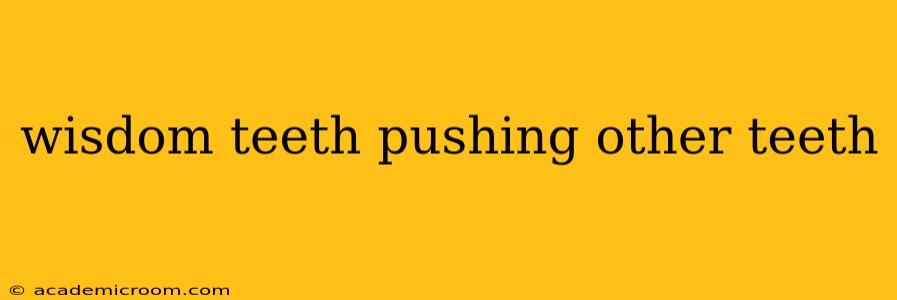Wisdom teeth, also known as third molars, are the last teeth to erupt in the mouth, typically emerging between the ages of 17 and 25. However, sometimes this eruption process doesn't go smoothly. A common problem is wisdom teeth pushing against other teeth, causing a range of issues that can affect your oral health and overall well-being. This article explores the causes, symptoms, and treatments for this prevalent dental concern.
What Causes Wisdom Teeth to Push Other Teeth?
The primary cause of wisdom teeth pushing other teeth is a lack of space in the jaw. Our jaws are genetically predetermined in size, and if there isn't sufficient room for the wisdom teeth to erupt fully and correctly, they can become impacted. This impaction forces the wisdom teeth to push against the second molars or other nearby teeth, potentially causing misalignment, crowding, and damage. Other contributing factors can include:
- Angle of eruption: Wisdom teeth may erupt at an angle, pushing against adjacent teeth.
- Bone density: Dense bone can impede the eruption of wisdom teeth.
- Genetics: Family history of impacted wisdom teeth increases the likelihood of experiencing the same issue.
What are the Symptoms of Wisdom Teeth Pushing Other Teeth?
The symptoms can vary depending on the severity of the impaction and the extent to which the wisdom teeth are affecting adjacent teeth. Common symptoms include:
- Pain and discomfort: This can range from mild aching to severe throbbing pain, especially when chewing or biting.
- Swelling: Inflammation and swelling of the gums around the wisdom teeth are common.
- Jaw pain: Pain can radiate to the jaw and surrounding areas.
- Headaches: In some cases, persistent pressure from impacted wisdom teeth can lead to headaches.
- Gum inflammation: Redness, swelling, and tenderness of the gums.
- Difficulty opening your mouth: Severe impaction can restrict jaw movement.
- Shifting of teeth: Noticeable movement or crowding of other teeth.
Can Wisdom Teeth Pushing Other Teeth Cause Damage?
Yes, untreated impaction of wisdom teeth can lead to several damaging consequences:
- Tooth decay: Food particles can become trapped around partially erupted wisdom teeth, leading to cavities.
- Gum disease (pericoronitis): Inflammation and infection of the gums surrounding the wisdom teeth.
- Cysts or tumors: In rare cases, impacted wisdom teeth can develop into cysts or tumors.
- Damage to adjacent teeth: The pressure from impacted wisdom teeth can cause damage to the roots or crowns of neighboring teeth.
- Malocclusion (bad bite): Shifting teeth can lead to misalignment of the bite.
How are Wisdom Teeth Pushing Other Teeth Treated?
The treatment approach depends on the severity of the impaction and the overall oral health of the individual. Common treatment options include:
- Monitoring: If the wisdom teeth are not causing any problems, your dentist may recommend monitoring their development with regular checkups.
- Extraction: This is the most common treatment for impacted wisdom teeth. Surgical extraction may be necessary for impacted teeth that are difficult to remove.
- Orthodontics: In some cases, orthodontic treatment may be used to create space for the wisdom teeth to erupt or to correct any misalignment caused by impacted wisdom teeth.
What are the Long-Term Effects of Leaving Impacted Wisdom Teeth?
Leaving impacted wisdom teeth untreated can lead to long-term complications, including:
- Chronic pain and discomfort: Ongoing pain can significantly affect your quality of life.
- Increased risk of infection: Recurrent infections can lead to further complications.
- Damage to adjacent teeth: This can require extensive and costly restorative treatments.
- Development of cysts or tumors: These can lead to serious health problems.
How Much Does Wisdom Tooth Extraction Cost?
The cost of wisdom tooth extraction varies widely depending on several factors, including the complexity of the procedure, the location of the dentist, and insurance coverage. It’s best to consult directly with your dentist for an accurate cost estimate.
Do Wisdom Teeth Always Need to be Removed?
Not always. If your wisdom teeth are erupting normally and don't cause any problems, they may not need to be removed. However, regular monitoring is crucial to detect any potential issues early.
Will My Other Teeth Shift Back After Wisdom Teeth Removal?
While some minor shifting might occur, the extent of teeth shifting after wisdom tooth removal varies. In many cases, orthodontic treatment might be recommended to align teeth after removal to prevent significant shifting.
This information is intended for general knowledge and does not constitute medical advice. Always consult with a qualified dentist or oral surgeon for diagnosis and treatment of wisdom teeth problems. They can assess your individual situation and recommend the most appropriate course of action.
